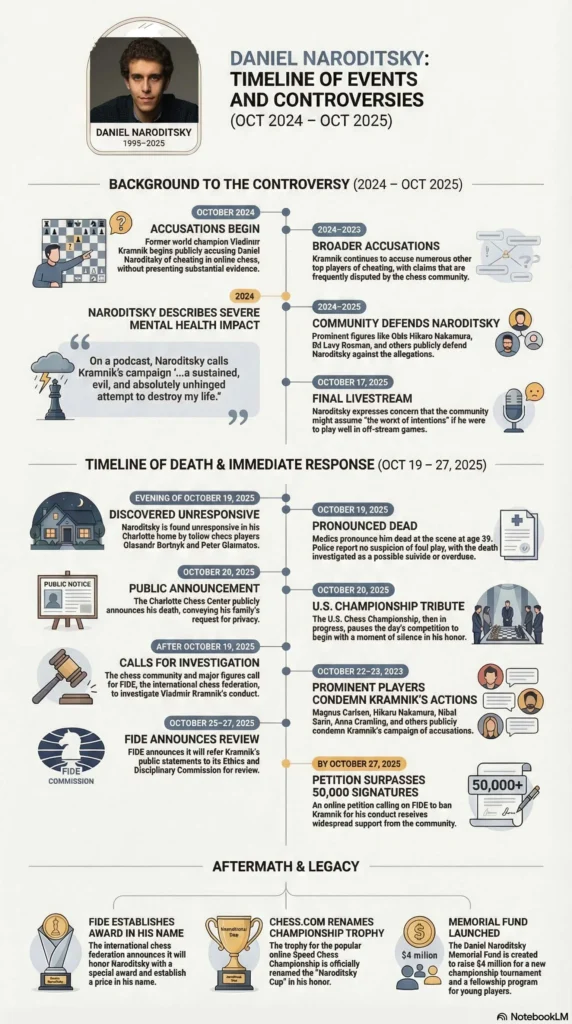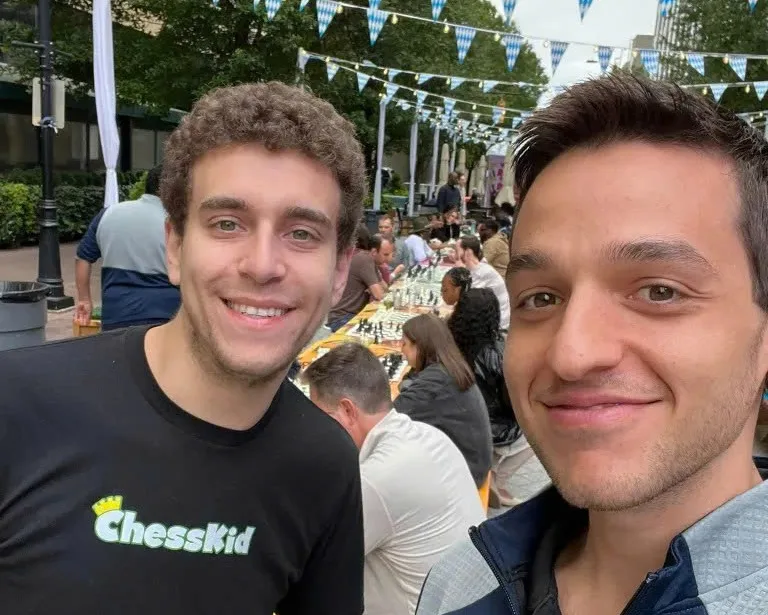Peter Giannatos, founder and director of the Charlotte Chess Center, has been one of the most vocal and visible friends speaking about the last days of Grandmaster Daniel Naroditsky. In a candid interview recorded in late November, Giannatos made a clear, repeated, and emphatic statement: in his view, Naroditsky did not take his own life.
The central claim: Giannatos’s view
Giannatos makes a straightforward point about the cause of death, and he couches it as an informed opinion pending official confirmation:
“My informed opinion here (it still remains an opinion until something official comes out) is that the cause of death was not suicide.”
He repeated the substance of that view multiple times in the interview and framed it this way:
“I do believe whatever happened was either natural or accidental, but not self-inflicted death.”
And he left little doubt about how strongly he felt:
“I would be shocked if the official report ended up coming out as suicide because of having countless conversations with Daniel, not just near his death, but also for years prior, and quite frankly, having surveyed the environment around him and throughout the home.”
Giannatos also noted that the Naroditsky family shares this view:
“They do share my opinion about that. Alan, his brother, asked me what my opinion was about it. I gave it to him. We are aligned in that there would have been no reason to believe that he would have taken his own life.”
Those lines are the strongest and most repeated factual assertions in Giannatos’s interview: he believes the death was not self-inflicted, he thinks it was natural or accidental, and Naroditsky’s family agreed with him.
The timeline Giannatos described — what he said he personally observed
Giannatos gave a detailed, first-person account of the hours and days leading up to when Daniel was found. Important facts he provided:
- He and others watched a troubling livestream in which Daniel appeared agitated and erratic. Giannatos described the stream as “very odd” and said it raised real concern among viewers and friends.
- He drove to Daniel’s home late that night and arrived with close friend Alexander “Sasha” Bortnyk. He described the entry and the conversation that followed:
“Sasha Bortnyk and I went over there late Friday night/early Saturday morning. Once the stream stopped, that wasn’t the end of it. I stayed with Daniel until about 3:00 a.m. Sasha probably stayed until 2:00 a.m. We had a lengthy conversation about a lot of different topics. Before I left, I asked him if he set his alarm for the Comet Open Championship that he was playing on Chess.com the following day. He said, ‘Yeah, I’ve got my alarm set. I’m ready to go.’”
- Giannatos emphasized that Daniel did play the Comet Open the next day and discussed match results with friends:
“Indeed, he did play the Comet event. He beat Bluebaum in the first match, lost to Alireza, and then lost a second.”
- When friends later grew concerned after not hearing from Daniel, Giannatos again checked on him. He described how he and Sasha observed Daniel through the window, attempted to rouse him, and then entered the home:
“We looked through the window and saw Daniel on the couch tucked away as if he was sleeping. We tried ringing the doorbell, but he wasn’t reacting. Then I decided to beat on the door really, really, really loudly. When Sasha said he didn’t see any movement, I went inside at that point and discovered Daniel lifeless there.”
- He described the emergency response and his own state:
“I asked Sasha to call 911. They were telling me what to do, such as removing him from the couch, placing him on the floor for CPR. I’m very fortunate that Charlotte Mecklenburg police and medic had come within 90 seconds of the call, because, as you might imagine, I’m not prepared for this.”
Giannatos used these details to underline a key point: Daniel was alive and functioning after the troubling livestream; he played in the online event the following day; he was not found immediately after the stream. Giannatos insisted that the timeline often reported online — that Daniel died the morning after his livestream — is incorrect.
“The one reason I say that is because there’s a misconception on the internet and in published articles on the timeline. It’s not that once the stream ended, that was it. He didn’t die the next morning or overnight. He died 36 hours later or something. And we certainly didn’t abandon him.”
Mental state, community response, and allegations
Giannatos did not shy away from discussing Daniel’s emotional state and the strain caused by public accusations:
“I was very worried, Ben, because that’s why I went over there. That was just as frightening to me as it was jarring to those people who were seeing it for themselves.”
He described coordinated attempts by friends and peers to engage and support Daniel during the troubling livestream and afterwards:
“Benjamin Bok, Hans Niemann, and Robby Kevlishvili and others were purposefully challenging him to games to just kind of engage him for the time that it would take us to be physically with him.”
On the topic of allegations — in particular those from former world champion Vladimir Kramnik and others that questioned Naroditsky’s integrity — Giannatos spoke forcefully about the emotional toll:
“There’s no doubt… the questioning of his integrity and the robbing of his integrity, that was as close to a physical stab as you could possibly get to him.”
He framed those public accusations as an ongoing burden that “weighed him down emotionally,” and said that the criticisms had come from people whose opinions Daniel valued — making the attacks especially painful.
What Giannatos would not say
Giannatos repeatedly refrained from divulging grisly specifics:
“I don’t really want to get into the specifics of what I saw.”
He stressed that his view about cause-of-death is an opinion, not the final legal finding:
“My informed opinion… is that the cause of death was not suicide.”
“It still remains an opinion until something official comes out.”
Why an official cause of death had not been released
- Toxicology testing takes time. In cases where drugs or self-harm are possible factors, comprehensive toxicology can take weeks to months (the reporting cites typical ranges such as 4–8 weeks in normal cases, and longer when tests are complex or labs are backlogged).
- Active police investigation. The Charlotte-Mecklenburg Police Department described the case as active and ongoing. Authorities commonly withhold partial findings to protect the integrity of the investigation.
- Medical examiners rule out multiple possibilities. Sudden deaths can stem from suicide, overdose, sudden cardiac events, medication interactions, or undiagnosed conditions; examiners must perform a forensic review before ruling.
- High-profile sensitivity. The death attracted global attention and strong emotional reactions; officials often take extra care in such cases to avoid mistakes or rushed conclusions.
- Family privacy requests. The family had asked for privacy in the early days, and authorities typically notify next of kin before public release.
- Mental-health sensitivity. When suicide is considered a possibility, jurisdictions follow stricter guidelines to reduce harmful speculation.
- Context of the Kramnik controversy. Because the case sits amid public allegations and an ongoing FIDE review related to Kramnik, authorities are likely to ensure their findings are airtight.
The reporting concludes that the delay in an official ruling is consistent with standard forensic timelines, not evidence of a cover-up.
What this means on the record
- On record, Peter Giannatos says — repeatedly and emphatically — that he believes Daniel Naroditsky did not die by suicide. He qualifies this as an opinion that will remain subject to the official medical examiner’s conclusion.
- Giannatos provided a firsthand timeline: he visited the home after a worrying livestream, stayed until around 3 a.m., saw Daniel play the next day, and later discovered Daniel when friends became worried.
- Giannatos described serious emotional harm done by public allegations that questioned Daniel’s integrity and said those attacks weighed on him.
- The official cause of death was not available at the time of the reporting; the reasons for that delay were standard forensic and investigative procedures.


I’m a passionate board game enthusiast and a skilled player in chess, xiangqi and Go. Words for Attacking Chess since 2023. Ping me at Lichess for a game or chat.

